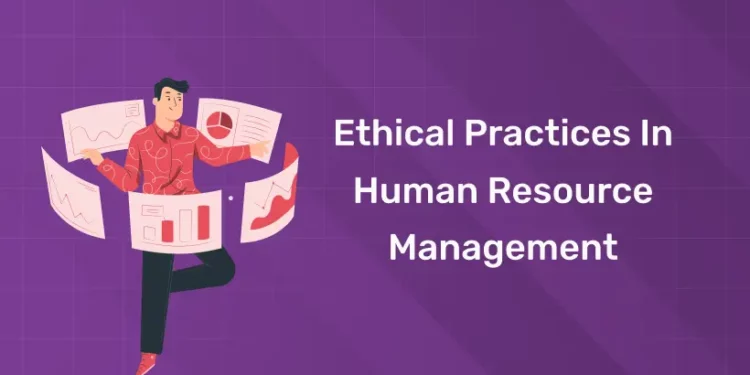Table of Contents
With the hustle and bustle of Human Resources’ life, we reach that crossroads of business ethics and personal values. HR ethics is not about being compliant; it’s about creating an environment that encourages integrity and dignity. We’re going to walk you through those underlying values which form the platform of ethical practice for HR professionals so that they’re prepared to deal with workplace subtleties of the day. Let us proceed to the nuts and bolts of HR ethics and how precisely we can lead the way in showing what doing the right thing is all about, and not the exception. In this article, we are covering ethical practices in Human resource management.
Looking for a HR Management Course? Click here to enroll for Entri’s HR Management Course!
Significance Of HR Ethics
When exploring the question of what is ethics in HR, it’s important to realize that our job is so much bigger than hiring and firing. HR ethics are a map that guides us to build a workplace on integrity. They’re not suggestions but giant checkpoints that affect every aspect of an organization—hiring through training, performance management, and beyond.
Following the ethical values is not only a way to protect the rights of the employees, but also of our company. It is a cultural motivator that makes workplace fair, respectful, and inclusive for all. Believing in employees is one more reason HR ethics are that important.
Our decisions impact people’s lives so profoundly and the shared nature of teams. Openness and fairness in our policies and procedures ensure that individuals are assured they feel safe because their workplace is based on ethical principles.
Fundamental HR Ethical Principles
Transparency and Truthfulness
Transparency and honesty form the foundation of ethical HR practices. We have to explain decisions, changes, and policies to all stakeholders openly. Here’s why:
- It builds trust among employees, making them feel worthwhile and secure.
- Guarantees every action can be traced and the possibility of misinterpretation or misunderstanding is minimized.
- Being honest about our capabilities and limitations keeps expectations realistic and helps prevent overpromising and underdelivering.
- When we’re transparent about the reasons behind our decisions, it can mitigate potential conflicts and promote an open dialogue.
Justice and Equity
Maintaining equality and justice is another basic HR ethics element. We have to create a workplace where:
- The employees are given equal treatment concerning opportunities for development and growth.
- Merit and performance are the basis for decisions on hiring, promotions, and firing.
This practice not only demonstrates our adherence to moral norms but also boosts the morale and productivity of the work of the employees. We do our best to prevent discrimination and bias and practice Fairness and Equity in our policies and practices, which must be according to the ethics of HR.
Confidentiality
Securing confidential data is most important to HR ethics. We take responsibility for securing employee data and maintaining confidential individual information. A few of what we have to do is:
- Have solid data privacy protocols.
- Train employees in how to handle confidential information.
- Confidentiality promise assures employees that their privacy is not invaded, and this is of utmost importance in the preservation of professional integrity.
- We should ensure that there are no breaches of confidentiality, hence upholding the ethical standard of respecting each person’s privacy within the organization.
By adhering to these ethical standards, we not only maintain our integrity but also allow employees to flourish in the workplace. How we enforce and sustain HR ethics also shows that we value the dignity of work and every human being. By upholding these standards, we guarantee a company culture that’s based on respect and position ourselves at the forefront of Human Resources.
Become an HR Expert – Enroll in Our HR Management Course Today!
Unlock the secrets to effective Human Resource Management with our expert-led course! Learn recruitment, employee relations, performance management, and more to build a thriving workplace. Start your journey toward a successful HR career today!
Know MoreHow To Handle Ethical Dilemmas?
Recognizing Ethical Dilemmas
When we have ethical issues in HR, it is important that we identify and resolve these issues in time. Ethical dilemmas usually occur when values clash or business and personal duties clash. We must recognize these dilemma situations as early as possible to remain on the ethics track. Some indications of potential dilemmas are:
- Instances where the action to be taken is ambiguous or sacrifices among stakeholders are involved.
- Interactions involving our values that are contrary to company policy or societal norms.
- Cases in which decisions may benefit one party at the expense of another.
By remaining vigilant to these signs, we increase our integrity and maintain the highest levels of HR ethics.
Frameworks For Ethical Decision-Making
To steer through the murky waters of ethical issues, we rely on sound ethical decision-making models. These models provide a structured means of examining options and making responsible choices. Essential components of these models are:
Gather all the facts that are relevant.
- Identify the people who will be affected by the decision.
- Consider the legal implications and company policies.
- Judge our actions against HR ethical standards, without compromising transparency, fairness, or confidentiality.
- Choose the most advisable line of action that is appropriate to both our professional duties and ethical standards.
By employing a step-by-step approach like this, we are able to make decisions confidently and ethically.
Finding Guidance
There are times when, no matter how hard we try, we’ll still be unsure of the most ethical path to follow. It’s at those times that it’s good to seek guidance. Those guides might be:
- Asking others who work with you or mentors who’ve been in the same kind of ethical dilemma.
- Learning through professional HR ethics codes, provide a treasure trove of knowledge regarding what is ethics in HR.
- Participating in open forums with stakeholders to hear various views.
- Discussing matters with legal or ethics experts in the organisation or broader HR profession.
We need to emphasize the necessity for guidance as a sign of strength and not of frailty and a commitment to maintain the high ethical standards that propel our profession in HR. Looking for assistance and advise from those around us utilizes our capability of managing ethical matters with dignity and compassion.
Master HR Management with Entri! Click here to enroll now!
Ethics In Hiring Talent
Talent acquisition is one of the major functions of HR that demands a great deal of knowledge of HR ethics; it is not just hiring but ethically making the process.
Encouraging Ethical Culture
In HR ethics, encouraging an ethical culture throughout talent recruitment is most important. We need to ensure fairness and transparency in the recruitment process. Our approach must clearly inform candidates that we expect integrity and ethical conduct from the initial contact with prospective applicants. Following is how we encourage an ethical culture:
- Ensure job postings are truthful and accurate, not misleading.
- Keep each application confidential, protecting personal information.
- Have non-discriminatory processes in place, providing each candidate an equal opportunity based on ability.
- Have recruitment methods that reduce unconscious bias, like structured interviews and mixed interview panels.
Leadership Impact
Setting an example of high ethical standards in HR requires strong leadership. As leaders, it is our responsibility to show through our actions how important moral action is in all aspects of hiring new employees. These are:
- Making right and fair decisions as well as making decisions that are good for our company.
- Maintaining the organization’s values in all its dealings with applicants.
- Sensitizing our recruitment ,managers to human resource ethics and how they can be applied in recruitment.
Our management practices management by example, showing our internal staff and future prospects that we are committed to upholding the highest ethical standards. By incorporating these protocols into our own hiring processes, we will not only be creating a better reputation for the company, but we will create a higher, more ethical workforce.
The Future of HR Ethics: Trends and Innovations
Looking to the future of human resources, it’s apparent that HR ethics will also continue to transform with the changing workforce landscape and technology. Our ethical compass has to keep changing to lead professionals towards building a equitable, respectful, and ethical workplace.
Emerging Trends
In HR ethics, we have a number of trends that are going to define the future of our practice. It is more vital than ever before that we understand and appreciate these trends so that we can remain at the vanguard of our practice and keep a robust and pertinent ethical platform.
A greater emphasis on wellbeing and mental health, with ethical standards demanding us to train our employees professionally but also as individuals. The gig economy is also growing, and this is raising moral concerns regarding the treatment of contract and freelancer workers. Diversity, equity, and inclusion are no longer buzzwords but increasingly are becoming the DNA of corporate ethics, compelling us to rethink our policies and strategies.
Technology and Ethical Practice
Technology is the driving force of shaping HR ethics of today and tomorrow. We are challenged to use technology in an ethical way, keeping our practices within the ethical standards we promote.
- HR analytics and big data are hugely potent but with the onus of keeping employees’ confidentiality and avoiding misuse of data.
- Artificial Intelligence and machine learning are revolutionizing talent management and recruitment procedures but must be implemented without injecting or embedding bias.
- The increased need for virtual and remote working spaces necessitates reconsidering how we track performance and activities without encroaching on private spaces or invading privacy.
We are leading with technology, and so we’re also implementing safeguards within our systems to protect against ethical breaches. We need to regularly do ethics audits of our tech tools and have transparency as our watchword in our operations.
Through integrating technology with our values, we will be able to make HR functionalities more robust and still retain the fundamental HR values. It can be done whether it is with equitable algorithms being used for recruitments, protected portals for data of the workers, or smart devices of learning that build responsible habits within people, the intersection of technology with ethics is redrawing the fate of our calling.
We are committed to adopting innovations that reach us and molding our ethical standards in HR, such that they exceed but fulfill the expectations and standards of our workforce. This constant process makes us the most dependable champions of work integrity.
Master HR Management with Entri! Click here to enrol now!
Become an HR Expert – Enroll in Our HR Management Course Today!
Unlock the secrets to effective Human Resource Management with our expert-led course! Learn recruitment, employee relations, performance management, and more to build a thriving workplace. Start your journey toward a successful HR career today!
Know MoreFrequently Asked Questions
Why is ethics important in HRM?
Ethics in HRM helps build trust between employees and management, reduces legal risks, enhances the company’s reputation, and promotes a fair and inclusive workplace.
How can HR handle workplace discrimination ethically?
HR should enforce strict anti-discrimination policies, provide training on diversity and inclusion, and establish a safe mechanism for employees to report discrimination cases.
What are ethical ways to handle employee grievances?
HR should provide a clear complaint process, keep matters confidential, and address issues fairly and without bias.
What ethical concerns arise in remote work management?
HR should ensure fair treatment, respect employees’ privacy, and provide equal opportunities for remote workers.
How can HR balance business goals with employee well-being?
HR should encourage work-life balance, provide wellness programs, and ensure fair workload distribution.
What are the ethical aspects of employee training and development?
All employees should have equal access to training, promotions should be based on merit, and feedback should be honest and constructive.










